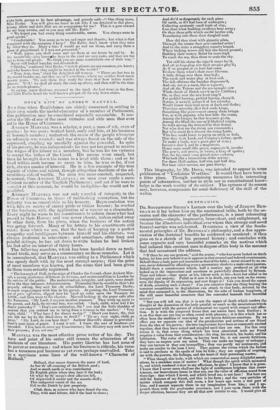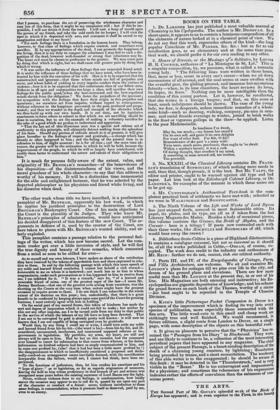BE NT FIAMI C S.
DR. SOUTHWOOD SMITH'S Lecture over the body of JEREMY BEETRAM as it lay before him on the anatomical table, both by the oc casion and the character of the performance, is a most interesting composition,—simple, impressive, benevolent, and enlightened, as became the illustrious individual over whom this strange and novel funeral-service was celebrated. It contains a view of the fundamental principles of Mr. BENTHAM'S philosophy, and a due appreciation of the doctrinal benefits he conferred on mankind : it then goes on to a sketch of his personal history; and concludes with some apposite and very beautiful remarks on the motives which had induced this eminent man to dispose of his body in the manner that had occasioned the address.
"If there be any one present," said the orator, "who has never looked on death before, let him now behold it as it appears in that revered and beloved countenance. Behold there a body pure and innocent as that of the babe ; never stained by an excess, never deformed by affording even a momentary abode to a malevolent passion. Behold there a countenance which, half a century ago; produced on all who looked on it the impressions and emotions so powerfully described by Brissot.. Time and labour—time spent as his, labour such as his—have but added to its benignity and majesty. Pallid as it now is in death, can you look on the sweetness, the dignity of its expression, and ever forget it? Can you dread the aspect of death, assuming such a shape? Can you conceive that any thing bearing the remotest resemblance to degradation can attach to that body, devoted, by the mind that animated it, to the illustration, for the sake of human happiness, of the still more beautiful structure that lies concealed beneath that beautiful exterior?
"But you will tell me, that it is not the aspect of death which renders the thought of the dissection of the body painful, so much as the associations which are connected with the person of whomsoever we regard with respect and efface tion. It is with the corporeal frame that our senses have been familiar; • it is on this that our eye has so often rested with pleasure ; it is this which has so often been the medium of conveying to our hearts delicious emotions. By no effort can we separate our idea of the peculiarities and actions of our friend from the idea of his person : the two impressions have been so constantly excited together, that they have mixed and mingled until they are one. For this very reason it is, that every thing which has been associated with my friend acquires a value from that consideration—his ring, his watch, his books, and his habitation. The value of these, as having been his is not merely fictition.$ they have an empire over my mind. They can make me happy or unhappy; they can torture or they can tranquilize; they can purify my sentiments, and make me similar to the man I love. They possess the virtue which the Indian is said to attribute to the spoils of him he kills ; they are capable of inspiring me with the powers, the feelings, and, the heart of their preceding master.
"What though this body, with which are connected so many delightful associe ations, be a senseless mass of matter ! What though the spirit which animated it, and which rendered it dear to my affections, be gone! I know that it is gone. I know that I never more shall see the light of intelligence brighten that come tenance, nor benevolence beam in that eye nor the voice of a*ction. sound from those lips : that which I loved, and which loved me, is not here! But here are still the features of my friend, and this is his form; and the very particles of matter which compose this dull mass, a few hours ago were a real part of him, and I cannot separate them in my imagination from him.; and I approach them with the profounder reverence, and I gaze upon them with the deeper affection, because they are el that now rennin to rap,. ',would give all.
that I possess, to purchase the art of preserving the wholesome character and rosy hue of this form, that it might be my companion still : but if this be impossible, I will not detain it from the tomb. I will cast a heap of mould upon the person of my friend, and take the cold earth for its keeper ; I will visit the i spot in which it s deposited with awe, and evermore it shall be sacred to my imagination and dear to my heart !
"For such feelings there is a foundation in the human heart. They belong, however, to that class of feelings which require control, and sometimes even sacrifice. If by any appropriation of the dead, I can promote the happiness of the living, then it is my duty to conquer the reluctance I may feel to such a disposition of the dead, however well-founded or strong that reluctance may be. The lesser evil must be chosen in preference to the greater. We may cause pain by doing that which is right, but we shall cause still greater pain by doing that which is wrong.
"It was under the influence of these feelings that our venerated friend acted. It is under the influence of these feelings that we have acted, who have been intrusted by him with the execution of his will. How is it to be expected that the uninstructed and ignorant—that those whose minds are full of prejudice and error, and whose habit of yielding to every impulse renders them the victims of violence—how is it to be expected that this unfortunate class of our fellow-men, hitherto in all ages and communities too large a class, will sacrifice their own feelings for the public good,7when the best-instructed and the best-regulated minds shrink from the obligation ? We foster the prejudices of the ignorant ; we sympathize with the feelings that have their origin in this prejudice and ignorance ; we ourselves act from impulse, without regard to consequences, without reference to the happiness prevented, to the pain produced and perpetuated ; and then we wonder at the depth and strength of the obstacles which we thus build up with our own hands. It is our duty, not by legislative enactments to force others to submit to that which we are unwilling should be done to ourselves but to set the example of making a voluntary sacrifice for the sake of a good which we profess to understand and appreciate. "That the last act of this illustrious man was a special and solemn act of conformity to this principle, will ultimately detract nothing from the splendour of his fame. Should any portion of ridicule attach to it at present, it will give place hereafter to the feelings of respect and gratitude,—a change which has already so often happened to him ; and the feeling of the present time is, in reference to hilt, of slight moment : he is for all time ; and the more time advances, the greater will be the estimation in which he will be held, because the improvement of the people, to which he will so largely have contributed, will enable them better to understand the nature and extent of their obligations to
It is much for persons fully aware of the extent, value, and originality of Mr. BENTHAM'S researches—of the benevolence of his disposition—of the disinterestedness of his views, and the moral grandeur of his whole character—to say that this address is worthy of his memory. It will be a distinction time immemorial for the able and enlightened lecturer, that he was selected by the departed philosopher as his physician and friend while living, and his dissector when dead.



























 Previous page
Previous page